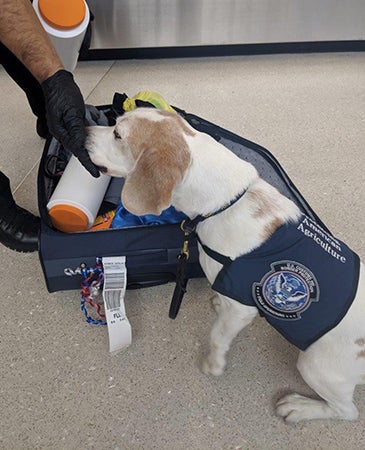
It was a call that all breeders dread.
The young couple, who had adored their puppy, reported they had a new baby, leaving no time for their dog.
Teri NeSmith did not hesitate.
“I gladly take any of my puppies back if the owner lets me know that they don’t want the dog. In fact, it is in my contracts that they contact me first.”
The 1-year-old Beagle soon returned to her kennel in Alabama, and the owner of Encore Beagles felt relief. He was healthy, socialized and smart.
“Baymon had an outstanding temperament, and he was exceptionally good at obedience and other fun events. I got his Fast CAT title on him quickly.”
NeSmith was at a dog show when a US Department of Agriculture (USDA) representative approached her and told her about the need for Beagles to work as agricultural detection dogs. She immediately thought of Baymon.
“She tested him for temperament. He passed with flying colors and entered their program,” NeSmith said.
That was nine years ago, and Baymon recently retired after an outstanding career as a detection dog at the Fort Lauderdale Hollywood International Airport in Florida. His keen nose located vast amounts of foreign contraband, such as meats and vegetables, preventing it from entering our country and introducing diseases or pests that can harm crops and forests. Baymon had many major finds, but it was a memorable day when he alerted on a suitcase that contained a whole hog’s head, said his handler Alberto Gonzalez of the US Customs and Border Patrol.
“Baymon loved going to work, to him it was like playing a game of hide and seek every day,” Gonzalez said. “Nothing really phased him. Even though we had large crowds of people, carts and loud sounds, he was always focused on finding his target.”
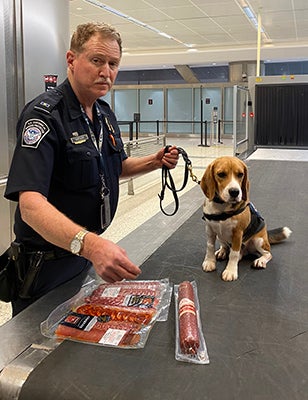
Job Openings for Good Noses
The USDA is in dire need of more dogs like Baymon to do this important work, said Monica Errico, training specialist at the USDA National Detector Dog Training Center (NDDTC) in Newnan, GA. The pandemic has made it even more difficult to locate canine candidates.
“Since the beginning of COVID 19, the USDA training center cancelled all scheduled classes and discontinued procurement of dogs,” Errico said. “The pandemic has made it extremely difficult to travel outside our commuting area of Georgia to look at potential candidates due to agency travel restrictions.”
Beagles and Beagle-mixes are the top choices for the USDA work in airports and ports.
“Beagles are non-threatening due to their small size, soft eyes and floppy ears and their playful, loving and even temperament,” Errico said. “Hounds are excellent at using their nose to hunt. When trained as agriculture detector dogs, they are exceptional at locating fresh fruits, plants and meats amongst many other odors that are in passenger baggage.”
The dogs perform two major functions: international-federal inspections, screening passengers returning from outside the US, and pre-clearance, inspecting luggage and packages entering the United States.
The NDDTC also trains Labrador Retrievers and Lab mixes to work in cargo, postal and parcel facilities, vehicle/border crossings, and on domestic projects. Labs, like Beagles have great hunting ability and friendly personalities, but have the larger size to search higher up in cargo warehouses and trucks.
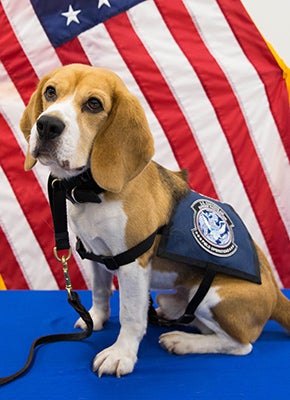
Shortage of Popular Breeds
The same traits that can make Beagles and Labs excellent detector dogs also make them popular pets, which has created even more of a shortage during the COVID crisis.
“The pandemic has made it possible for many people to have a dog because of people’s ability to telework and be at home most of the time with their dogs,” Errico said. “In turn, there are less Beagles being brought to the shelters.”
The NDDTC scouts for candidates in many places, including shelters, rescue organizations, and breeders. The center would like to work with more breeders since the dogs are likely to be healthy and socialized.
Kevin and Kim Shupenia have bred Beagles for nearly 30 years and produced dozens of conformation champions at their Jackpot Kennel in Georgia.
But over the past five years, their dogs have also gone to work for the government. Six of their Beagles serve as detector dogs at airports around the country. The service is a good option for some dogs that are returned from pet homes or do not continue in their breeding program.
“I do think it’s important work for the Beagle as they love a job, and it’s good PR for the breed,” Kevin Shupenia said. “Personally, I want them using dogs that look like an AKC Beagle as much as possible because it represents us all well.”
The Shupenia’s attended the graduation ceremony for two of their dogs after they completed training.
“It made us proud to see our dogs receive their vests and get posted with their handlers to their new locations,” Kevin Shupenia said.
The Right Stuff
Before purchasing a dog, the USDA evaluates the dogs for temperament and trainability. They seek dogs that are 1 to 4 years of age and that have:
- High food drive
- Bold, curious natures
- Friendly, outgoing temperaments
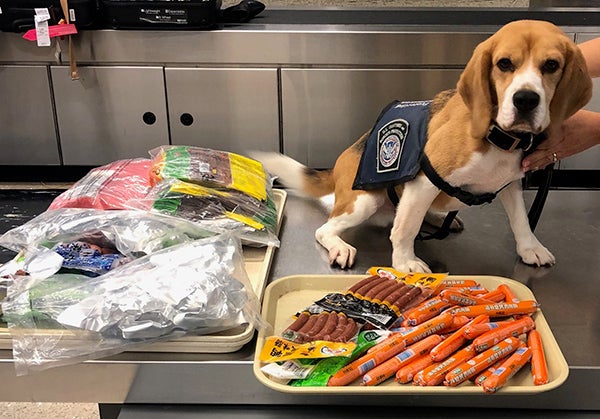
The NDDTC trainers conduct the official temperament evaluation at the Atlanta Hartsfield International Airport. “We assess their temperament by exposing the dogs to the sights, sounds and crowds of passengers,” Errico said.
If the dogs pass the airport testing, they progress to a thorough medical screening, including x-rays and blood work.
If they are found to be sound and in good health, the dogs enter the six-week basic training course.
“They are trained to sit and pinpoint agricultural products such as fruits, meats and plants in luggage. We use positive reinforcement such as treats to shape behaviors,” Errico said. “They are also trained not to respond to many similar products such as fruity candy, soaps, spices, cheese, bread and fish.”
Successful dogs are paired with a handler and attend a course at the NDDTC, where they learn to become a team. The canine teams must pass a certification and then are deployed to their ports. Most Beagles go to work for the NDDTC’s largest client: US Customs and Border Patrol.
“The Beagles are the first line of defense against pests or diseases that are harmful to our crops and forests,” Errico said.
An infiltration of pests could cost the U.S. billions of dollars in eradication, crop yield, animal effects and economic trade.
Since Baymon, NeSmith had two other dogs enter service with the USDA. She encourages other breeders to consider placing dogs into a role where they can help the country.
“If I have a puppy that won’t make the show dog world, but has a great personality and loves to work, I call USDA,” she said. “It makes me happy to see my dogs doing something they love.”
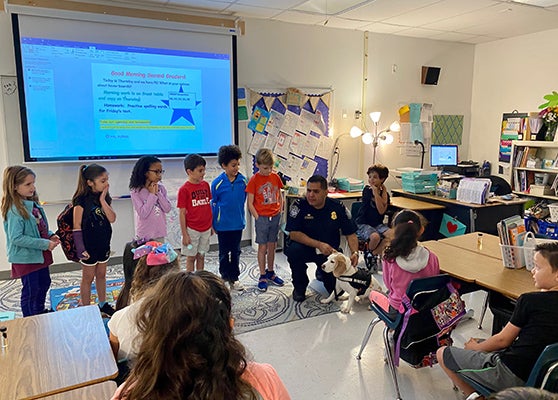
As for Baymon, he is 10 years old and retired to home life with his lifelong handler Gonzalez where he is getting a well-deserved rest for his years of service.
“He sleeps on the couch with his fur sister, Diamond, a rescued Brittany,” he said. “He also likes his afternoon strolls in the neighborhood, eating snacks, and Netflixing and chilling.”
Breeders may contact the NDDTC at 770-254-2523.

